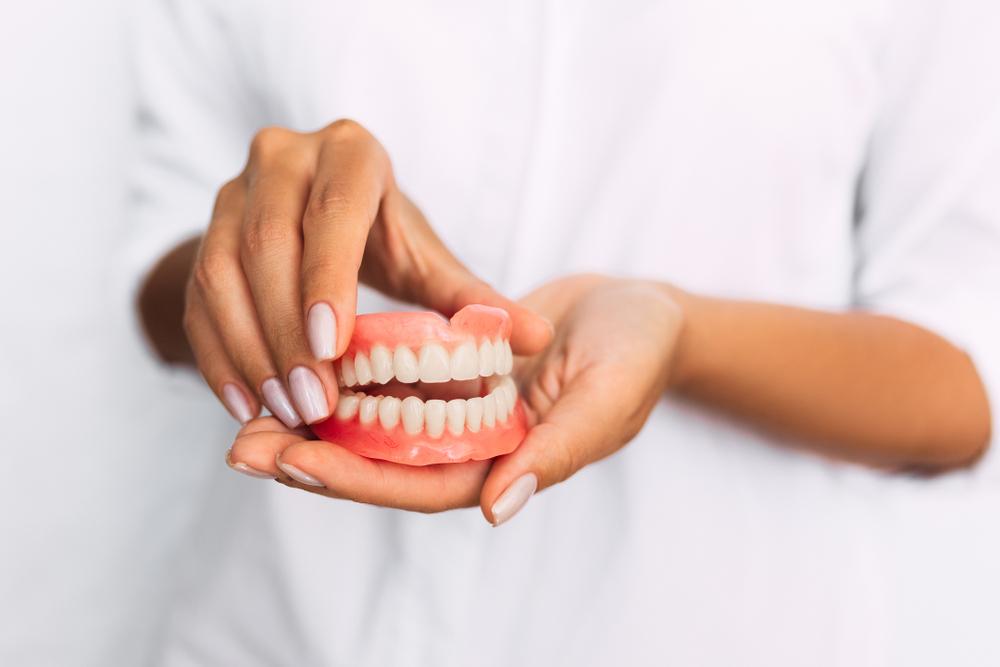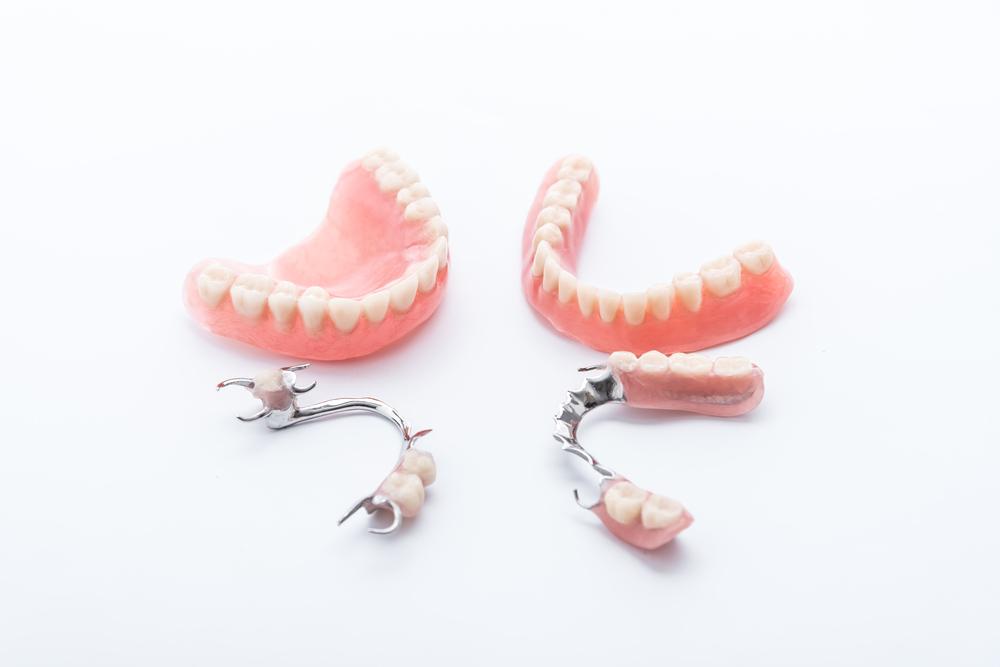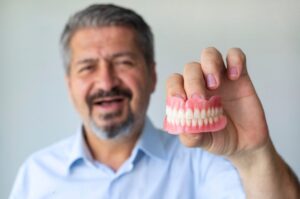Premium Dentures, Partials & Implant-Supported Appliances
Your Ultimate Dental Solution

In the world of dental solutions, dentures, partials, and implant-supported appliances have emerged as game-changers in enhancing oral health and improving the quality of life for millions worldwide. These innovative solutions not only restore functionality but also bring back the confidence that comes with a healthy, radiant smile.
Dentures are custom-fitted artificial teeth that replace an entire arch of lost or missing natural teeth. On the other hand, partials fill in the spaces created by a few missing teeth, preventing other teeth from changing position and adding function and esthetics. Implant-supported appliances take both dentures and partial dentures to the next level by providing a more stable and durable solution, with the prosthesis anchored securely to the jawbone through dental implants.
Whether you’ve lost your teeth due to age, disease, or injury, these premium dental solutions offer an effective way to regain your oral health, restore your smile, and enhance your overall wellbeing. In this guide, we’ll delve deeper into these options, their benefits, and how they can be your ultimate dental solution.
FAQ’S
Understanding Dentures
Dentures are prosthetic devices designed to replace missing teeth and restore the functionality and aesthetics of a natural smile. They are custom-made to fit the unique shape and size of a patient's mouth, allowing individuals with missing teeth to regain their ability to eat, speak, and smile comfortably. Dentures are an effective solution for people who have lost their natural teeth due to various reasons, such as decay, gum disease, injury, or aging.
There are two primary types of dentures: complete dentures and partial dentures.
1. Complete Dentures: Complete dentures are used when a patient has lost all their natural teeth in either the upper or lower jaw, or in both. These dentures consist of a full set of artificial teeth mounted on a gum-colored acrylic base. The upper denture covers the roof of the mouth (palate), while the lower denture is designed to accommodate the tongue and the shape of the lower jaw. Complete dentures are held in place through suction and the natural contours of the mouth, along with dental adhesive when necessary.
2. Partial Dentures: Partial dentures are utilized when a patient has only lost some of their natural teeth and has remaining healthy teeth. These partial dentures are designed to fill the gaps left by missing teeth. Partial dentures consist of artificial teeth attached to a metal or acrylic framework. This framework attaches to the existing natural teeth using clasps or precision attachments to keep the partial denture securely in place.
Benefits of Using Complete Dentures:
There are several advantages to using dentures, which make them a popular choice for individuals with missing teeth:
1. Restored Aesthetic Appeal: Dentures are crafted to resemble natural teeth, helping individuals regain their smile and facial structure. This aesthetic enhancement can boost self-esteem and confidence.
2. Improved Chewing and Speech: Dentures enable individuals to eat a wider variety of foods and speak more clearly. Missing teeth can affect speech and chewing, and dentures help to overcome these challenges.
3. Support for Facial Muscles: Dentures provide support for the facial muscles, which can otherwise sag or appear sunken due to tooth loss, thus preventing premature aging.
How Complete Dentures Improve Oral Health?
The use of dentures contributes significantly to improved oral health:
1. Supports Gum Health: Dentures help distribute the pressure of chewing across the gum tissue evenly, reducing the risk of irritation and sore spots that can result from uneven pressure on the gums.
2. Enhances Digestion: Proper chewing with dentures aids digestion. When individuals can chew their food thoroughly, it can improve nutrient absorption and overall digestive health.
3. Encourages Regular Oral Hygiene: Dentures require regular cleaning and maintenance, promoting better oral hygiene habits. This care extends to the gums and any remaining natural teeth.
Complete dentures are an invaluable solution for those missing teeth, offering a range of benefits that extend beyond restoring oral function and aesthetics. Dentures can enhance oral health, promote overall well-being, and help individuals enjoy a better quality of life, even after experiencing tooth loss.
Partial Dentures: A Closer Look
Partial dentures are a type of dental prosthetic that are designed to replace missing teeth when a patient still has some natural teeth remaining in their mouth. They serve as a practical and cost-effective solution for individuals who are not candidates for full dentures and want to fill in the gaps left by missing teeth. Partial dentures can greatly improve a person's ability to eat, speak, and smile comfortably.
When are Partial Dentures Recommended?
Partial dentures are recommended in several situations, such as:
1. Multiple Missing Teeth: When a patient is missing several teeth but still has some healthy natural teeth, partial dentures can be an ideal solution. They are custom-made to fit the patient's mouth and are designed to seamlessly blend in with the existing teeth.
2. Cost-Effective Solution: Partial dentures are often a more cost-effective option compared to dental implants or fixed bridges, making them accessible for patients who have budget constraints.
3. Preventing Teeth Shifting: When there are gaps due to missing teeth, the adjacent natural teeth can gradually shift into those spaces. This can lead to misalignment and bite problems. Partial dentures help maintain the proper spacing and alignment of teeth.
4. Functional and Aesthetic Improvement: Partial dentures not only restore the ability to chew and speak but also improve the appearance of the smile. They are customized to match the color, shape, and size of the existing natural teeth, ensuring a harmonious blend with the rest of the mouth.
Advantages of Partial Dentures:
Partial dentures offer several advantages that make them a popular choice for individuals with missing teeth:
1. Improved Chewing and Speech: One of the primary advantages of partial dentures is their ability to restore proper chewing function, allowing individuals to enjoy a wider variety of foods. They also help with speech, as missing teeth can affect pronunciation.
2. Enhanced Aesthetics: Partial dentures are custom-made to match the patient's natural teeth, providing a natural and aesthetically pleasing appearance. This can boost self-confidence and improve overall facial aesthetics.
3. Comfort and Convenience: Modern partial dentures are designed to be comfortable and secure. They are custom-fitted to the patient's mouth, minimizing any discomfort or shifting during use.
4. Maintenance of Oral Health: By preventing teeth from shifting and filling in gaps, partial dentures help maintain the alignment of the remaining natural teeth. This can promote overall oral health.
5. Versatility: Partial dentures can be removed for cleaning and maintenance, making them easy to care for. This versatility allows for thorough oral hygiene, as well as convenient removal for sleeping and cleaning.
6. Cost-Effective: As mentioned earlier, partial dentures are often a more affordable option compared to dental implants or fixed bridges. This makes them an attractive choice for those on a budget.
Partial dentures provide a practical and versatile solution for individuals who have some missing teeth but still retain natural teeth. They offer numerous advantages, including improved function, aesthetics, and oral health, making them an excellent choice for those seeking to restore their smile and overall well-being. If you have missing teeth and are considering a dental prosthetic, discussing the option of partial dentures with your dentist is a worthwhile step to consider.
Implant-Supported Appliances: The Next Level of Dental Solutions
Implant-supported appliances represent a significant advancement in the field of dental prosthetics. Unlike traditional dentures, which rely on suction, adhesives, or clasps for support, implant-supported appliances are anchored to the jawbone through dental implants, providing a stable and long-lasting solution for missing teeth.
Explanation of Implant-Supported Appliances:
Implant-supported appliances, often referred to as implant-supported dentures or overdentures, are a type of dental restoration that combines the stability of dental implants with the aesthetics and functionality of dentures. The process typically involves the following steps:
1. Dental Implant Placement: Dental implants, which are small, titanium posts, are surgically placed into the jawbone at strategic locations. These implants serve as artificial tooth roots.
2. Healing and Osseointegration: Over a period of several months, the bone tissue in the jaw fuses with the implant posts in a process known as osseointegration. This provides a solid foundation for the appliances.
3. Attachment of the Appliance: Once osseointegration is complete, a specialized denture or appliance is securely attached to the implants. This appliance can be removable or fixed in place, depending on the patient's preference and needs.
Benefits and Advantages of Implant-Supported Dentures:
Implant-supported appliances offer numerous advantages over traditional dentures, making them an appealing choice for many patients:
1. Stability and Comfort: Implant-supported dentures are incredibly stable to minimize shifting during eating or speaking. This provides increased comfort and confidence for the wearer.
2. Improved Chewing Efficiency: The enhanced stability allows for more efficient chewing, enabling patients to enjoy a wider variety of foods, including tougher and harder-to-chew items.
3. Enhanced Aesthetics: Implant-supported appliances are designed to look natural and aesthetically pleasing. They blend seamlessly with the remaining natural teeth, improving the overall appearance of the smile.
4. Preservation of Bone Density: Dental implants stimulate the jawbone, preventing bone loss, which can occur with traditional dentures. This helps maintain facial structure and prevents a sunken appearance associated with bone resorption.
5. Durability: Implant-supported appliances are long-lasting and can provide decades of use with proper care and maintenance.
6. Better Oral Health: The stability of these appliances supports oral health by preventing the irritation of the gum tissue and reducing the risk of gum infections or sores commonly associated with traditional dentures.
How Implant-Supported Appliances Enhance Oral Health:
Implant-supported appliances have a substantial positive impact on oral health:
1. Bone Preservation: The presence of dental implants in the jawbone helps maintain bone density similar to natural teeth. This prevents the bone from deteriorating over time, a common issue with traditional dentures, which can lead to changes in facial structure and overall oral health.
2. Gum Health: The secure fit of implant-supported appliances reduces the risk of gum irritation and inflammation, promoting healthier gum tissue.
3. Stability and Function: Patients can eat and speak with confidence, as these appliances minimize movement, making daily oral functions easier and more comfortable.
4. Oral Hygiene: Cleaning and maintaining implant-supported appliances are relatively straightforward, supporting good oral hygiene practices.
Implant-supported appliances represent a significant advancement in dental prosthetics, offering unparalleled stability, aesthetics, and oral health benefits. These appliances provide a practical and long-term solution for individuals with missing teeth, enhancing their quality of life and overall well-being. If you are considering tooth replacement options, discussing the possibility of implant-supported appliances with your dentist is a valuable step to explore.
Comparing Dentures, Partials, and Implant-Supported Appliances
When it comes to replacing missing teeth, there are several options available: dentures, partials, and implant-supported appliances. Each of these choices has its own set of advantages and drawbacks, particularly when considering cost-effectiveness, durability, and comfort.
Dentures
Dentures are removable prosthetic devices designed to replace missing teeth.
1. Cost-effectiveness: Dentures tend to be the most affordable option when it comes to full-mouth tooth replacement, making them a popular choice for many. However, they need to be replaced or adjusted over time, which can add to the overall cost.
2. Durability: While dentures are designed to withstand daily use, they aren't as durable as implants. They can break if dropped and may wear down over time, necessitating replacement.
3. Comfort: Comfort varies from person to person. Some find dentures comfortable enough, while others may find them awkward or irritating. They can also impact speech and eating habits.
Partials
Partial dentures, often simply referred to as "partials," are used when some natural teeth remain. They are anchored to these existing teeth.
1. Cost-effectiveness: Partials are again a more cost-effective solution than bridges or implants to replace missing teeth. However, like full dentures, they will need periodic replacement or adjustment.
2. Durability: Because they're anchored to existing teeth, partials tend to be more durable than full dentures. However, they are reliant on the health of the support teeth to which they anchor.
3. Comfort: Partial dentures are generally more comfortable than full dentures due to their secure fit. However, like full dentures, they can affect speech and eating habits.
Complete dentures are an invaluable solution for those missing teeth, offering a range of benefits that extend beyond restoring oral function and aesthetics. Dentures can enhance oral health, promote overall well-being, and help individuals enjoy a better quality of life, even after experiencing tooth loss.
Implant-Supported Appliances
Implant-supported appliances are permanently affixed to the jawbone and can replace anything from a single tooth to a full set of teeth.
1. Cost-effectiveness: Implants have a higher upfront cost compared to dentures or partials. However, their longevity can make them more cost-effective in the long run, as they don't require regular replacement like dentures and partials do.
2. Durability: Implants are the most durable option. Made from robust materials like titanium, they can handle biting and chewing similar to natural teeth.
3. Comfort: As implants mimic the function and feel of natural teeth, they offer the highest level of comfort. They don't limit what types of food you can eat and don't impact speech.
The best tooth replacement option depends on a variety of factors, including budget, lifestyle, and personal preference. It's essential to discuss these aspects with your dentist to determine the best solution for your specific needs.
Conclusion:
In summarizing, dentures, partials, and implant-supported appliances each present their unique advantages and considerations. Dentures are a cost-effective solution, partials offer a balance between affordability and fit, while implant-supported appliances provide a long-lasting and stable option, though at a higher cost.
The key takeaway from this article should be the importance of making informed decisions about your oral health care. It's essential to understand that proper oral health goes beyond aesthetics; it also impacts your overall well-being and quality of life. Therefore, choosing the right dental solution requires careful thought and consultation with a dental professional.
We invite you to explore our range of premium dental solutions at Kokomo Family Dentistry. Whether you're considering dentures, partials, or implant-supported appliances, our team is ready to guide you through the process. We're committed to providing high-quality, durable, and comfortable options that enhance your smile and boost your confidence. Don't hesitate to reach out and start your journey towards optimal oral health with us today!





Let’s Get Started
Call Us:
Office Hours :
Mon-Fri: 8:00am-5:00pm
Email Us :
appointments@kokomodentistry.com
Address :
604 East Boulevard, Suite A, Kokomo, IN 46902






